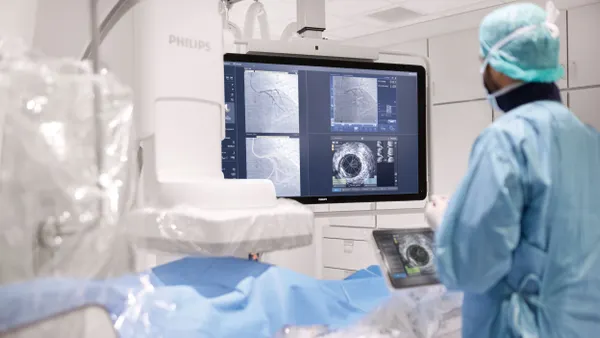Dive Brief:
- Adoption of Medtronic's newly acquired Mazor robotics technology helped drive interest in spine implants in the fourth quarter, supporting about 4% revenue growth in the restorative therapies unit, the company reported Thursday morning.
- Those sales represented the strongest growth of any of Medtronic's businesses, contributing to about $8.15 billion in quarterly revenue. Overall company performance was approximately flat compared to last year, but good enough to beat the consensus analyst estimate by about $30 million. Medtronic closed out its fiscal year in the green, growing revenues 2% to $30.6 billion.
- Medtronic cited U.S.-China tariffs, a disruption to sterilization processes, healthcare provider wariness of drug-coated balloons and tough competition in businesses like diabetes as headwinds affecting the end of its fiscal year.
Dive Insight:
Growth in the company's restorative therapies and minimally invasive therapies units helped balance a quarter that saw declines in diabetes and cardiac and vascular business performances.
Surgeons began using Medtronic's Mazor X Stealth robotic systems for spinal surgery in January, the fruit of a $1.7 billion deal last September. And demand for the robots spurred new interest in its other spine products, Medtronic said.
The company's recent investment in Titan Spine could be a sign of more tuck-in acquisitions to come, management suggested. "Expect more of that," said CEO Omar Ishrak, on the heels of closing out fiscal year 2019 with reported free cash flow of $5.9 billion.
Management said more detail would come this fall on the minimally invasive surgical robot platform the company has been developing. The system is independent of the Mazor program.
Some analysts considered performance in the cardiac and vascular group a bit light, which Medtronic countered with anticipation of increased transcatheter aortic valve replacement (TAVR) system sales next year. Medtronic presented data in March indicating its Evolut device is as safe and effective as open heart surgery in a low-risk population. Paired with the fact Edwards Lifesciences' had data indicating superiority of its TAVR device in low-risk patients, FDA and CMS are expected to expand TAVR's indication and widen reimbursement for the procedure, which would be a plus for Medtronic revenues.
Sales in the diabetes unit fell 2.9% as the insulin delivery and continuous glucose monitor markets grow more competitive, particularly with activity from Abbott, Dexcom and Insulet. Ishrak said a launch of the 780G, the latest version of Medtronic's hybrid closed loop system, will likely happen toward the end of the year.
Other recent sticking points for Medtronic include the February shutdown of the Sterigenics sterilization plant in Illinois, which Boston Scientific also cited as a disruption on its most recent earnings call. Medtronic CFO Karen Parkhill said the impact to business won't likely be resolved until the end of the first quarter. Medtronic expects a slowdown in revenue of about $20 million to $30 million as a result, she said.
A similar slowdown could come from FDA's June meeting on paclitaxel-coated devices. Medtronic's Admiral drug-coated balloons are among the devices implicated in FDA's warning about high mortality rates related to the balloon and stents. Management said the company has data on more than 1,800 closely followed patients and feels "comfortable" about its own version of the device heading into the advisory panel.
Medtronic predicts organic revenue growth of 4% in fiscal year 2020. The company hit 5.5% organic growth in the fiscal year ended April 26. Shares in Medtronic were up about 2% in early trading Thursday.












